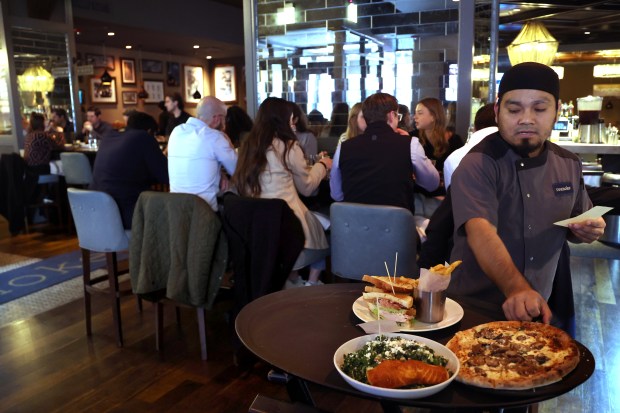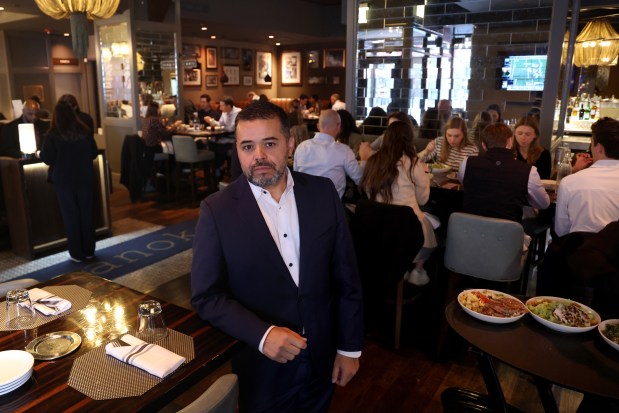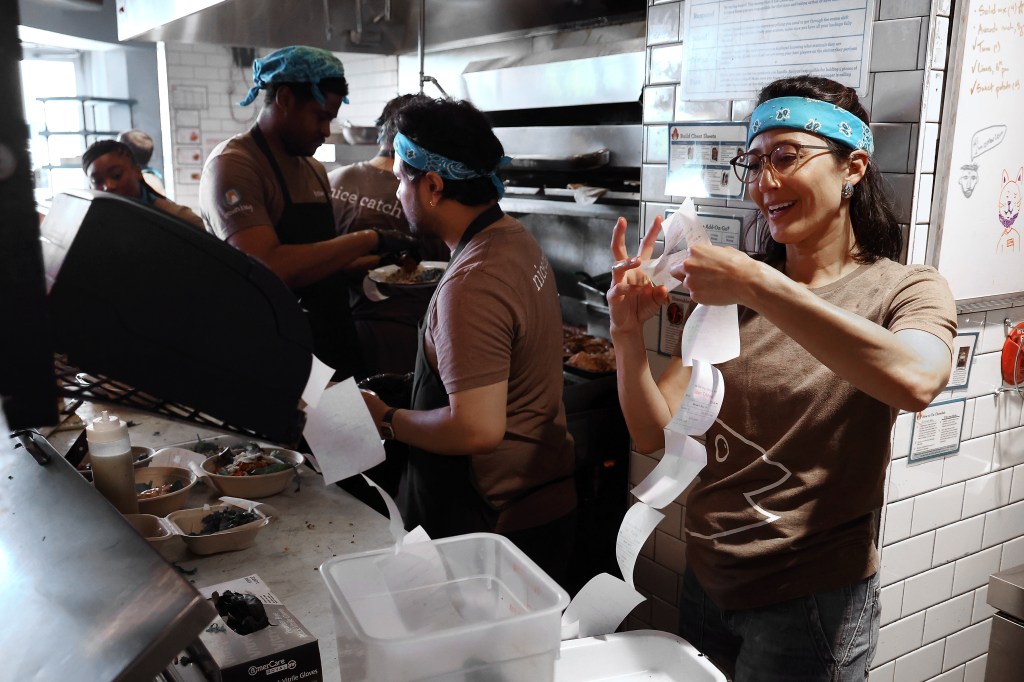With all eyes on the U.S. Supreme Court as it weighs whether or not the Trump administration can deploy the National Guard to Illinois, Loop business owners worry a bigger federal presence could scare off their customers and workers.
“I’m not seeing troops marching down Wacker Drive yet, but I do feel there is an increasing sense of anxiety,” said Donna Lee, founder of Brown Bag Seafood Co., which operates seven Chicago restaurants.
Other downtown restaurants have already seen lower foot traffic and staff not showing up to work, said Brad Alaoui, chief operating officer of Roanoke Hospitality, which runs five restaurants in River North and the Loop, including The Roanoke at 135 W. Madison St.
 A server delivers meals for diners at The Roanoke restaurant in Chicago, Oct. 21, 2025. (Antonio Perez/Chicago Tribune)
A server delivers meals for diners at The Roanoke restaurant in Chicago, Oct. 21, 2025. (Antonio Perez/Chicago Tribune)
“We’ve had a lot of staff call off,” he said. Restaurants are already more vulnerable because beef and produce prices are rising, “and as restaurant operators our costs will go up further without enough workers. That adds more pressure and uncertainty.”
Chicago business leaders said a protracted occupation will further damage the city’s economy, and pointed to conditions in Washington, D.C., and Los Angeles, where troop deployments and crackdowns on immigrants lacking permanent legal status launched by the U.S. Department of Homeland Security have tamped down everything from tourism and restaurant traffic to retail sales.
“It just creates fear, chaos and then that’s going to hurt local businesses,” said Jack Lavin, president and CEO of the Chicagoland Chamber of Commerce.
So far, downtown restaurants and other retailers haven’t felt much pain from Operation Midway Blitz, the campaign announced by DHS in early September. Few reported large declines in sales or foot traffic, but agents from U.S. Immigration and Customs Enforcement and the Border Patrol have been much more active in heavily Latino neighborhoods such as Little Village on Chicago’s Southwest Side, and haven’t been very visible downtown since Sept. 28.
 Brad Alaoui, chief operating officer of Roanoke Hospitality, at The Roanoke restaurant in Chicago, Oct. 21, 2025. (Antonio Perez/Chicago Tribune)
Brad Alaoui, chief operating officer of Roanoke Hospitality, at The Roanoke restaurant in Chicago, Oct. 21, 2025. (Antonio Perez/Chicago Tribune)
Downtown business owners want to avoid what’s happened along 26th Street in Little Village, where immigration raids have left many restaurant workers too afraid to show up for work and customers nervous about eating out, said Sam Toia, president of the Illinois Restaurant Association.
“Folks are not going to work,” he said. “I’ve heard from some of our members (in Little Village) that they don’t have enough help coming in. They are just very cautious about ICE agents.”
The federal crackdown began in June, first in Los Angeles. Then in August, President Donald Trump deployed both National Guard troops and DHS personnel to Washington, D.C., claiming they were needed to combat crime.
Restaurants in the nation’s capital were hit hard, Toia said.
“We’ve heard from our counterparts in D.C., where they saw some restaurants go down 30% in sales,” he said. “So, this is definitely creating fear among Chicago diners and restaurants. The fear would go up even more if the National Guard was put in place.”
More than seventy percent of Washington D.C. restaurants surveyed reported a significant decline in sales and foot traffic in the last two weeks of August, said Shawn Townsend, president of Restaurant Association of Metropolitan Washington.
Townsend said National Guard troops mostly walked around near major tourist attractions and federal properties downtown. Washington, D.C. residents are accustomed to a heavy police presence near the city’s monuments, but in other neighborhoods, aggressive DHS actions scared off many restaurant employees, making it difficult for some businesses to operate.
“We know immigrants are the backbone of our industry here,” Townsend said. “Without them, our industry does not survive.”
“There is definitely a chill in the air, with fewer people on the streets, and businesses, especially restaurants, are feeling the crunch for sure,” said Diane Gross, the owner of Cork Wine Bar & Market, a restaurant in the Logan Circle neighborhood of Washington, D.C.
Larger, full-service restaurants that do a lot of prep work are especially dependent on immigrants, she added, and ICE raids “are creating a lot of fear in our neighborhoods, especially the neighborhoods where (restaurant) employees live. Other restaurants had a lot of people not show up.”
Even restaurants like Cork Wine Bar & Market, which doesn’t rely on immigrant labor, have suffered. Gross estimates she saw a 30% decline in sales during the first two weeks of September.
“It’s been pretty dramatic,” she said.
Trump announced plans on Oct. 4 to deploy hundreds of National Guard troops to the Chicago region, but was temporarily blocked by a federal judge after the city and state filed a lawsuit. The Trump administration filed an appeal with the U.S. Supreme Court.
Deploying troops without the approval of Gov. JB Pritzker and Mayor Brandon Johnson is not the way to fight crime, according to Derek Douglas, president of the Civic Committee and the Commercial Club of Chicago.
“Sending in troops, independent, disconnected, uncoordinated from what all the rest of us in Chicago are doing on the ground is not helpful,” he said. “That’s not the type of intervention that we want to see.”
There are some signs a heavy federal presence could hurt Chicago’s downtown.
DHS launched a show of force in downtown Chicago on Sept. 28. Dozens of immigration agents, most wearing patches of the U.S. Border Patrol, patrolled streets near Millennium Park and the Riverwalk, before moving up to the Gold Coast neighborhood.
The following Sunday, the Chicago Loop Alliance saw a significant drop in attendance at its Sundays on State event, said Michael Edwards, the group’s president.
The block party closes a portion of State Street to vehicular traffic, and attracted about 100,000 visitors to a previous event on Sept. 7, but about 70,000 showed up on Oct. 5.
“The weather was really beautiful, so that’s a pretty steep drop,” said Edwards, who noted that the decline in attendance could have been due to publicity surrounding Operation Midway Blitz. “It does have a chilling effect on business.”
At the end of September, around the time federal agents were marching downtown, there was also unusually low foot traffic at Mindworks, an interactive science museum on Michigan Avenue across from the Art Institute, said Amy Boonstra, executive director of the Roman Family Center for Decision Research at the University of Chicago Booth School of Business, which runs Mindworks.
“There was certainly fear towards the end of September, but in the past couple of weeks we’ve gotten back to our usual fall traffic numbers,” Boonstra said. “We want people to feel safe and welcome coming downtown because we really do depend on the walk-in traffic.”
Downtown restaurants have also seen some repercussions.
Scott Weiner, co-owner of the Fifty/50 Group, which runs several downtown restaurants including 90th Meridian in the Financial District and Kindling in Willis Tower, said they’ve seen a small decline since the federal crackdown began.
“It’s not as dramatic as other cities or in Little Village, but we’ve seen more cancellations at our downtown places, more than usual, and the people doing it seem to mostly be from the suburbs,” Weiner said. “I don’t think they want to deal with it.”
The combination of federal troop deployments, aggressive enforcement actions and street protests will exacerbate the challenges faced by all Chicago businesses, Lavin said.
“Employees feel unsafe so they don’t show up to work,” he said. “It hurts local businesses — especially hurts in the retail corridors where people maybe are scared to go out and shop. It deters tourism, keeps people away from restaurants.”
Tribune reporter Robert Channick contributed.
